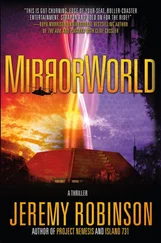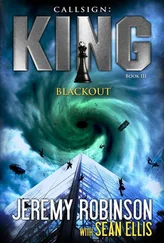She crossed her arms. “We’ll wait.”
“For who?” Hawkins asked.
When she didn’t answer, Hawkins drew his machete slowly. “Listen, lady, we’ve just watched three of our friends give birth to those monsters outside the door. The things that have happened on this island are reprehensible, and I’m not just talking about what Bennett is doing.”
“Doctor Celia Green,” Bray said, holding up a name-tagged lab coat.
“You were conducting human experimentation long before Bennett staged his coup,” Hawkins said.
“We had no choice,” one of the men said, his voice booming with the defensive passion of a man who knows he’s about to be judged for his actions.
“Always a choice,” Hawkins said.
“They would have killed us,” a woman said through her tears.
“They’re still going to,” Hawkins said.
“What do you mean?” Green asked.
“Who are you waiting for?”
She didn’t answer.
“Son of a bitch,” Bray said. He held up an ID card he’d taken from the lab coat pocket. He handed it to Hawkins. It showed a picture of Green, perhaps five years old, looking young and innocent.
“Ignore the information,” Bray said. “Look at the logo.”
Hawkins noticed a strange glimmer when he shifted the card. The logo was holographic. He turned it in the light and saw an oblong globe with five bold letters written across it: DARPA.
“Darpa?” Hawkins asked.
“Defense Advanced Research Projects Agency,” Bray said. “They were founded in 1958, in the wake of Sputnik, and worked on high-tech R and D for the U.S. military. They’re the guys who gave us stealth technology, the Internet, and the M16. But they have their hands in all the sciences; robotic, cyber, electronics, energy, weapons, space, and the most relevant—biology. In 2010, they started a research program to eliminate, and I quote, ‘the randomness of natural evolutionary advancement.’ That sounds pretty damn close to playing God, right? The end goal is to create organic, living, intelligent life that can live indefinitely. And in case you’re worried about these new life forms rebelling against their creators, they’re engineering loyalty into their DNA and giving them kill switches. That’s the bright and cheery future of modern warfare—silicon soldiers. They called the whole thing BioDesign.”
Green looked surprised. “How did you know about that?”
“I was researching the subject for my next book, but it wasn’t hard to find. BioDesign is the kind of scary shit DARPA puts in the budget ,” Bray explained. “The whole world knows about BioDesign. And that’s because it’s benign compared to what you’re doing.” Bray stepped up to the woman. “What’s the catchphrase you use to justify what you do here? ‘Combat performance’? ‘Biomedical research’?”
Green’s eyes fell to the floor. “Biological warfare defense.”
Bray’s face turned red with anger. “That’s the same fucking language the Japanese used. Anything is justified when you put it under the umbrella of defending the homeland. This can’t be an official program.”
“It’s not,” Green said. “Like all government agencies, DARPA has some black operations that no one is supposed to know about. But even the most top-secret projects find their way into the DARPA rumor mill. Scientists are naturally curious, and like to talk about their work. We were good about keeping things from the public, but not so good about keeping secrets from each other. As long as everyone in the loop had the security clearance, no one complained. We were all on the same team and shared the same goals. The thing is, despite the work here being my area of expertise, I never heard about this island. Not once. And I was friends with the DARPA director. She’s a good woman. A moral woman. There’s no way she knew about this place. I’d be surprised if any of the current DARPA leadership knows about what goes on here, if they even know about the island at all. Whoever started the program set it up so that it could operate autonomously while still having access to DARPA’s workforce for recruitment. I don’t know who that was, but at the time, there was a lot of postwar and cold war paranoia.”
“If the Russians are working on it, we better, too,” Bray said.
“Right,” Green said. “So the project was put under DARPA’s umbrella, but somehow shielded from oversight and allowed to evolve on its own. By the time I got here, it was a very dark place.” She sighed and shook her head. “Look, DARPA is a good agency. We want to change the world, but for the better. This island… the things done here… the things I’ve done here… are against everything DARPA stands for.”
“If you’re so against the biological warfare defense program, why are you here?” Bray asked.
“We were all recruited from other biological programs,” she said. “It was presented as a dream post. Tropical island. Cutting-edge research. The only downside is that we couldn’t talk about our work, publish our work, or quit until the project was complete.”
“But you didn’t know the program had been in operation since World War Two?” Hawkins said.
She shook her head. “Or that it wouldn’t conclude within our lifetimes. And none of us knew what the job really was until we got here.”
“And then it was too late,” one of the men said.
“They would have killed you,” Hawkins said.
Green nodded. “They killed some.” She frowned. “Not all of us are that strong.”
Hawkins sheathed his machete. “Now that we’re playing nice, I’m going to ask again: Who are you waiting for?”
She pursed her lips for a moment, then sighed and answered, “Bennett left us here. For a long time.”
“He said a year,” Bray said. “Why didn’t you just leave?”
Green turned around and lifted up her straight, black hair. A small device, the size of a black pack of gum, was attached to the back of her neck. “If we leave a certain radius, it explodes. The only way we can leave is if we’re within one hundred feet of Bennett’s remote.”
Hawkins tensed. What these people had done was wrong, even under the circumstances, but no one deserved this.
“We have access to our quarters, bathrooms, a kitchen, and food storage. We’ve been living in just these few rooms for the past year. It took a lot of trial and error, but we repaired a satellite phone we found in one of our… deceased colleague’s quarters and powered it with some old batteries. It worked long enough to make a call.”
“Who did you call?” Hawkins asked.
“Michael Castle,” she said. “He recruited all of us, but I never got the impression he knew what went on here. He sounded genuinely shocked when I spoke to him.”
“Still,” Bray said. “Why not call the DARPA director? You said you were friends.”
“She was scheduled to retire a few months after I accepted the post,” she said. “And I’m pretty sure no one but Castle knows where the island is. He called back an hour later. Before the battery died, he told me to expect extraction today. Bennett wasn’t here at the time. We’re not sure they’ll be prepared for his response.”
“I’m not sure you’re prepared for their response,” Hawkins said. “They came once before, right?” The look on her face was all the answer he needed. “If they’re coming back, it’s not with a small team, it’s with an army.”
“And I hate to break it to you,” Bray said, “but your job here was a life sentence. Whoever is really running this program, they’re not going to let you leave. I doubt they’ll let you live. You’re a liability, especially after what Bennett has done. They’re not going to take any risks. Smart thing would be to incinerate the whole island and wipe out anything with a DARPA logo.”
Читать дальше












